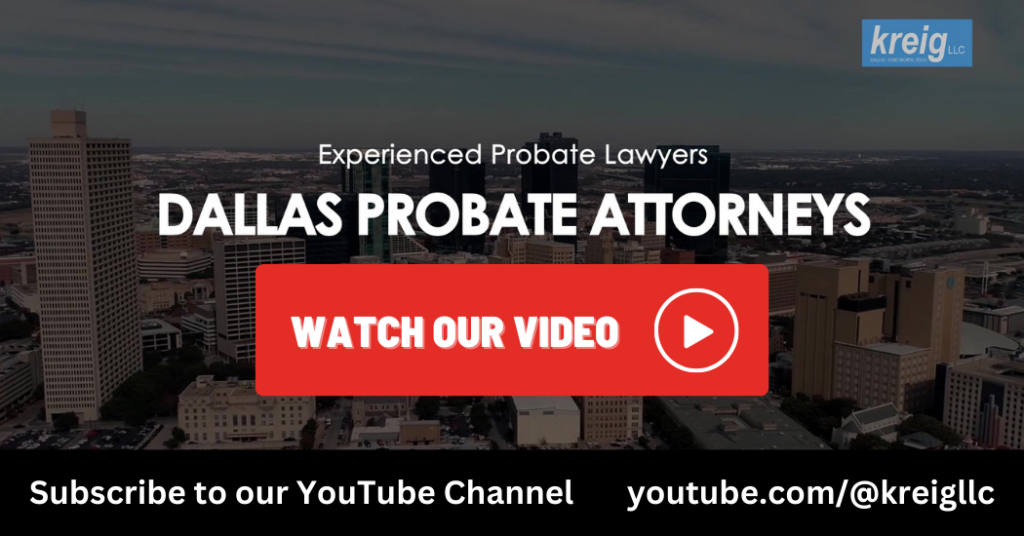There is no set limit for when probate administration is required or warranted in Texas. While some large estates may not have to go through probate, some small estates do.
Alongside other factors such as family disputes or complex financial arrangements, the value of the estate and the nature of its assets play a significant role in determining whether probate is necessary.
In this article, we will explore the cost of probate and the different options available for varying estate sizes, focusing on situations where the cost of probate is the primary concern.
The Cost of a Probate in Texas
Since the cost of probate is likely the primary reason why you found this article, we’ll start there as this is likely the largest factor that is weighing on your decision-making.
Naturally, the cost of a full probate administration varies depending on the complexity of the estate and factors such as attorney fees and court costs. These costs can include making complex accountings, getting assets appraised, filing estate tax returns, and even operating businesses and working with trusts and trust assets.
The base cost for these services and fees can range from $3,000 to $5,000, typically. However, for larger estates with more complexities, the cost can be significantly higher. This means that the estate assets should be worth more than this for someone to consider a probate administration in Texas.
Probate vs. Non-Probate Assets
There are several caveats that have to be considered. The distinction between probate vs. non-probate assets is one of them.
It’s crucial to understand that not all assets go through the probate process. Texas recognizes non-probate assets that bypass probate and pass directly to designated beneficiaries. These assets include those held in a living trust, assets with designated beneficiaries such as life insurance policies and retirement accounts, and jointly-owned property with rights of survivorship.
The distinction between probate and non-probate assets is essential because estates primarily composed of non-probate assets generally do not incur the same costs and delays associated with the probate process. They are distributed according to the instructions or designations made by the deceased person during their lifetime. This distinction can allow even large estates to potentially avoid probate.
Exempt Assets
Exempt assets refer to those that are protected from creditors and are not subject to claims made against the estate. Examples of exempt assets in Texas include homestead property, certain retirement accounts, life insurance proceeds, and annuities with designated beneficiaries, among others. T
While it’s important to understand that certain assets are exempt from probate in Texas, it’s equally crucial to note that even exempt assets will usually still need to go through the probate process and, if so, will incur associated costs. Unlike non-probate assets, there is usually some action needed to set aside or segregate exempt assets–which is a function of the probate process.
Options for Varying Estates
Texas provides various approaches to estate administration based on the size and complexity of the estate. Understanding these options helps individuals navigate the probate process efficiently and cost-effectively.
For Nominal, Modest, and Large Estates
In Texas, if the value of an estate exceeds $75,000, a full probate administration is typically required. This threshold, as stated in the Texas Estates Code, includes the total value of the estate’s assets, excluding homestead and exempt property.
Estates valued above this amount will generally need to go through probate.
In situations where there is a valid will, it is possible to probate the will as a muniment of title, which can be a faster and less costly method of handling the probate process. This is technically a probate, but it does not involve many of the steps of a full probate.
For Pretty Small Estates
For estates valued below $75,000, Texas offers an expedited and cost-effective method known as the Small Estates Affidavit. This option simplifies the estate administration process, eliminating the need for a full probate administration.
To use the Small Estates Affidavit, the interested party must file an affidavit with the court, including the deceased person’s will (if applicable) and a list of the estate’s assets and debts.
The cost associated with the Small Estates Affidavit typically ranges from $1,000 to $3,000, covering court costs and attorney fees. Thus, the estate assets should exceed this amount for this to be a viable option.
For Very Small Estates
In cases where the estate consists solely of vehicles or has minimal assets, Texas law provides alternatives to full probate administration.
The Texas Motor Vehicle Affidavit
The Texas Motor Vehicle Affidavit is a solution when the estate’s assets are limited to motor vehicles, allowing for the transfer of ownership without probate. The purpose of the Texas Motor Vehicle Affidavit is to simplify the transfer of ownership and ensure a smooth transition of motor vehicle assets. By providing the necessary information and establishing their eligibility as a transferee, individuals can avoid the complexities and costs associated with probate.
The Texas Motor Vehicle Affidavit is not filed with the Texas Department of Public Safety (DPS) or the Department of Motor Vehicles (DMV). Instead, it is typically filed with the county tax assessor-collector’s office or the county clerk’s office in the county where the deceased person resided at the time of their death.
To obtain a Texas Motor Vehicle Affidavit, the individual seeking the transfer must fulfill certain requirements. First, they must provide specific information about the vehicle, including its make, model, year, and vehicle identification number (“VIN”). Additionally, they need to establish their relationship to the deceased person, such as being a surviving spouse, heir, or a person entitled to inherit under the Texas Estates Code.
Affidavit of Heirship
Another option for very small estates is the Affidavit of Heirship. This affidavit is used when there is no valid will or when the will does not name an executor, and the primary asset of the estate is real estate.
The Affidavit of Heirship serves as a sworn statement that establishes the heirs of the deceased person and their entitlement to the estate. It requires gathering information about the deceased person’s family members, their relationship to the deceased, and other relevant details.
The Affidavit is filed in the county real estate records in the county in which the real estate is located. The document itself can then be evidence of title and ownership.
Unclaimed Property
In cases where the estate’s value is minimal and the cost of any probate option exceeds the estate’s worth, waiting for property, often cash, to be paid to the Texas Comptroller as unclaimed funds can be a viable alternative.
This option is applicable when the estate has negligible cash assets that one does not have an immediate need for the funds. Individuals can choose to wait for the funds to be turned over to the Texas Comptroller’s office as unclaimed property and file an application with the Comptroller for the funds.
The Takeaway
When it comes to determining whether an estate needs to go through probate in Texas, there is no fixed limit. While some large estates may not require probate, some small estates may still need to go through the process. Various factors, including the value and nature of the assets, influence the decision. Understanding the available options based on estate size and complexity is crucial in navigating the probate process efficiently and cost-effectively. Whether it’s a nominal, modest, or large estate, Texas provides different approaches to estate administration.
Our Dallas Probate Attorneys provide a full range of probate services to our clients, including helping with the probate process. Probate is what we do. Affordable rates, fixed fees, and payment plans are available. We provide step-by-step instructions, guidance, checklists, and more for completing the probate process.We have years of combined experience we can use to support and guide you with probate and estate matters. Call us today for a FREE attorney consultation.
Disclaimer: The content of this website is for informational purposes only and should not be construed as legal advice. The information presented may not apply to your situation and should not be acted upon without consulting a qualified probate attorney. We encourage you to seek the advice of a competent attorney with any legal questions you may have.
Don't miss out, get a copy today!












